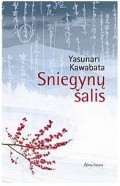 Original language:
Japanese
Original language:
Japanese Translated from: Japanese
Authors: Kawabata, Yasunari
Translated by: Baronina, Indrė
ISBN: 978-9955-24-877-4
Published in: Vilnius
Published on: 2008
Publisher: Alma littera
“Snow Country” is a novel which resembles a sumi-e painting, in which the author uses language as subtle as brushstrokes to create the scenery of northern Japanese province and relationships between characters. This novel – which took the author more than a decade to finish – is a delicate portrayal of human emotion and relationships. The main character Shimamura, a married man from Tokyo, goes on vacation to a snowy hot spring town in the northern Japan, seeking peace and calm. However, instead of relaxation the wealthy man finds himself slipping into a rather difficult situation, involving two women. In the little town Shimamura meets the sensuous geisha Komako, whose liveliness excites him, making the man want to come back to the same village more often. With every one of Shimamura’s visits his interest for Komako intensifies.
However, one time while riding the train he sees a young and innocent girl named Yoko, who is the complete opposite of Komako. Not able to resist the lively company offered by the passionate Komako, yet drawn to the innocence of Yoko, Shimamura is being torn between them.
“Snow Country” started off as a short story, written by Yasunari Kawabata in 1935. Later on, during the course of more than a decade, the story around the main characters grew, and finally in 1948 the novel was complete. The slow passing of time can be felt while reading the novel, because the action is slow and flowing with many descriptions of scenery and nature, which show the skill in Yasunari Kawabata’s writing.
Yasunari Kawabata is one of the most brilliant and most widely read writers in Japan. In 1968 the author was awarded the Nobel Prize in Literature for his excellence, becoming the first Japanese writer to achieve such wide recognition. Three of his most valued novels are – “Snow Country”, “Thousand Cranes” and “The Old Capital”. Yasunari Kawabata, alongside Haruki Murakami, best represent the Japanese literature to the world.
